Do Budgies Make Good Pets? 6 Pros and 6 Cons
Thinking of adding a small parrot to your family? For most people, the first species they consider is the budgerigar, also known colloquially as the budgie (Melopsittacus undulatus). Not surprising given that budgies are the #1 most popular pet parrot species in the world! But does that mean they're the right choice for you? Do budgies make good pets?
To help you choose, Parrot Essentials discusses 6 pros and 6 cons of keeping budgies. These tiny birds are often underestimated and viewed as low-maintenance beginner parrots - but is that true?
Do Budgies Make Good Pets? The Pros
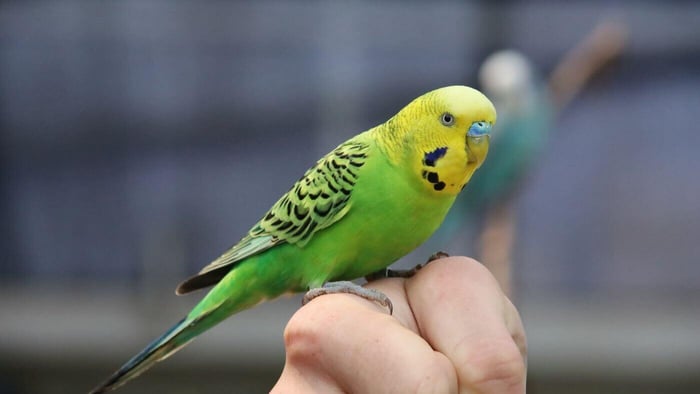
1. They're Very Cheerful
If you're looking to add a bit of life to your home, you can't go wrong with budgies. These little parrots spend much of their day cheerfully warbling and playing, and it's hard not to go along with their delightful antics.
Having kept sizeable flocks of budgies - we don't recommend you keep a solo parrot unless you work from home, as they thrive on social contact - we can attest to the fact that it's almost impossible to stay in a bad mood when you've got a bunch of happy birds sitting on your shoulders and playing with your hair.
2. They Can Talk
When people think of talking parrots, the graceful African Grey is often the first thing that comes to mind. We can't deny that greys are the best talkers of all, but adopting one is also a significant responsibility that most families can't accommodate.
If you want a parrot that can learn to imitate words and tunes, a budgie might be a better choice for you. Small but mighty, the males can acquire incredibly impressive vocabularies. Consider that the record for "largest vocabulary for a bird" has been held since 1997 by a budgie named Puck! With patience and training, many become talented little chatterboxes.
3. They Are Not Too Loud
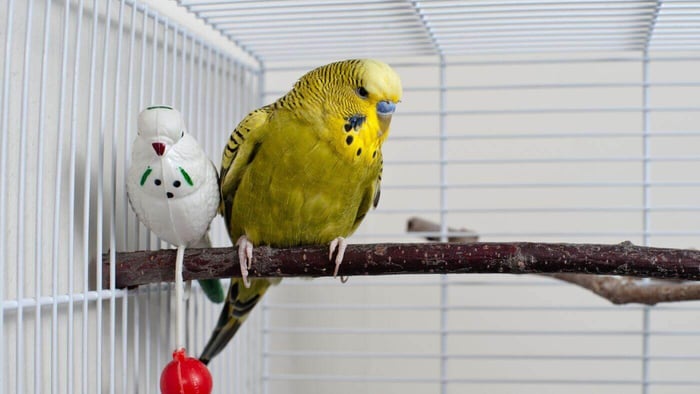
We have to be upfront here: no parrot is quiet. Folks looking for a bird that doesn't make too much noise are better off opting for species like doves or quail. In fact, if you're highly intolerant to chatter, it's probably a better idea to forego birds altogether.
If you don't mind endless (and in our opinion, pleasant) warbling and the occasional small screech, though, budgies make a good choice. They certainly don't reach the decibel level that the majority of their larger cousins do, and they shouldn't bother the neighbours unless the walls are very thin.
4. They're Small
Their small size puts some prospective parrot owners off budgies, feeling like they want a more substantial pet. But keep in mind that budgies' size also comes with many advantages! For example, although all parrots require a roomy cage to thrive, a budgie doesn't need an enclosure the size that larger birds do.
Additionally, although an untamed budgie can still deliver an impressive bite if you scare it, you won't have to think about the actual safety of your fingers and ears while training it. The reduced cost in terms of food and toys are also factors to keep in mind.
5. They Can Learn to Do Tricks
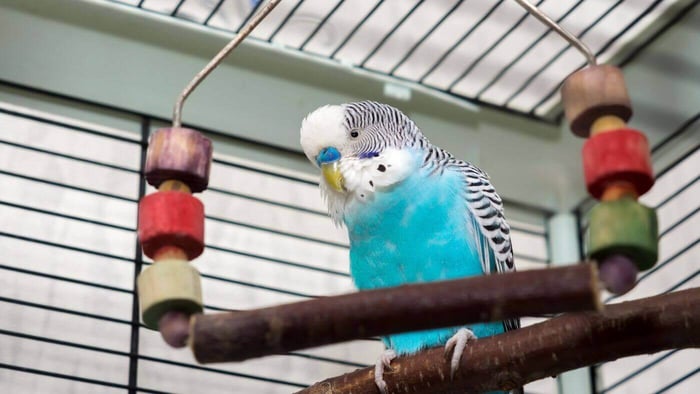
We've already discussed budgies' talent for talking, but their surprising intelligence levels extend further than that. To some people's surprise, these miniature parrots are highly trainable, especially if you're familiar with the concept of positive reinforcement using food as a reward.
Although animal training always takes patience, you can teach a budgie all sorts of tricks, ranging from the useful (stepping up on your finger, going into a travel cage) to the silly (waving, playing fetch, twittering on command, and much more).
6. They Can be Very Affectionate
Although, as with all parrots, their personality depends on training and individual nature, budgies can make incredibly affectionate pets. A tame budgerigar will view its human family as part of its flock - and want to be a part of it at all times.
Whether they prefer hitching a ride on your shoulder, receiving head scratches, or just observing the household goings-on from a distance, budgies' social nature can make them a great choice for people in search of a bird they can really bond with.
Do Budgies Make Good Pets? The Cons
1. It's a Long Commitment
Did you know that even a small parrot like a budgie can live for over 20 years with a combination of luck and loving care? The oldest budgie recorded by the Guinness Book of World Records lived for over 29 years! Even those that don't make it to such a respectable age can be expected to stick around for at least 10 to 15 years.
Are you in a position to provide care for your feathered friend during its entire lifespan, including paying vet bills if it falls ill? Remember that animal shelters are generally already overrun with abandoned budgerigars, so finding yours a good home if you're unable to keep it in the future may not be easy.
2. They're Hyperactive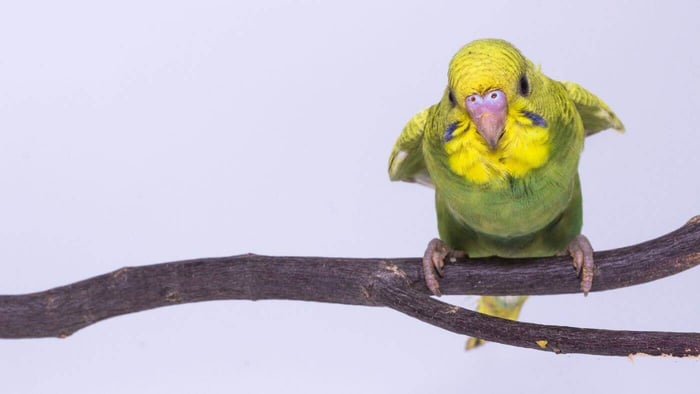
The same characteristics that make budgies such a cheerful addition to the home can become grating if you're not prepared for them. The noise - not too loud, but still noise - is pretty much constant. Additionally, even small birds like these need time out of their cage on a daily basis, and they can cause a good bit of mayhem as they zoom around the house, argue over food, and contend for the attention of their human family.
If you're looking for a calm pet, budgies are not for you. These pocket rockets never sit still! For this reason, they also don't tend to get along very well with calmer parrots like cockatiels, which appear to view budgies' activity level as undignified and can lash out as a result.
3. They Make Noise
We suspect that parrots' noise levels are the main reason so many people give them up after a short period of time. As such, we want to stress one more time that although budgies are very quiet as far as parrots go, they are by no means silent.
You can expect your pet budgerigar(s) to start making noise as soon as the sun comes up. There will be brief pauses for napping and eating, but otherwise, they continue chattering until it gets dark in the evening, with a peak in the noise level around sundown. And remember: as fun as it is to teach your parrot to whistle, you need to be prepared to hear that same little tune dozens of times a day!
4. They Need Attention to Stay Tame
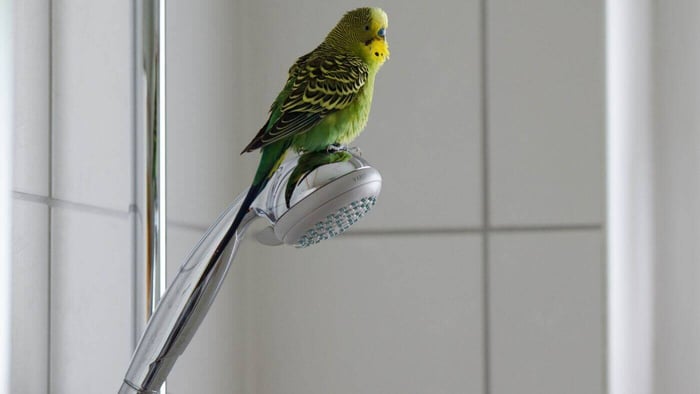
As mentioned, a budgie can become very tame and make for a highly affectionate pet. However, there are never any guarantees, plus your bird's tameness is something you need to keep up with. Parrots are not "set-and-forget" creatures.
A budgie will require daily attention, including training time, in order to maintain the bond between the bird and its owner. If you keep yours stuck in its cage left to its own devices, it can become fearful and timid. It may even turn nippy if it feels threatened; remember that you're like a giant to these tiny birds. If they're not aware that the giant approaching them is friendly, they will do everything in their power to get away.
5. They Poop - a Lot!
Although they're very small, budgies are messy creatures. Adding one to your home will certainly not improve the cleanliness level! Prepare to hoover the bird room daily, as seeds will be strewn all over the place, and feathers will end up in the most unlikely nooks and crannies. Not to mention the poop: birds relieve themselves every fifteen minutes.
It's not just the cage, either. As mentioned, budgies need daily time in a secure room to roam outside their cages. If you're not willing to spend a few minutes every day cleaning their favourite hang-out spots of small droppings and other debris, they may not be right for you.
6. They're Destructive
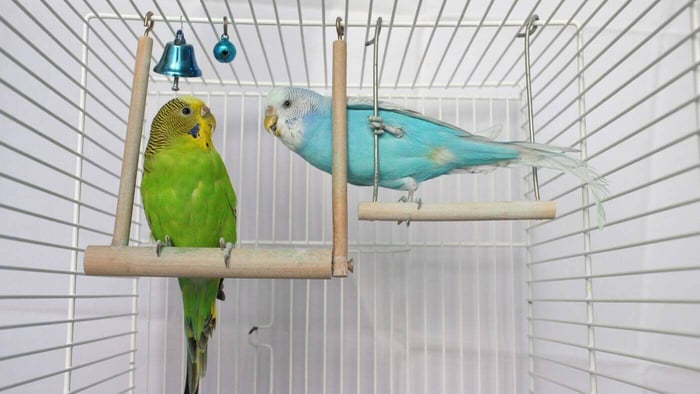
Did you know that chewing is a natural instinct for parrots? They shred items made of wood, paper, and the like in order to keep their beaks in good condition and to satisfy their desire to build a safe nest. When out of their cage, they're prone to chewing items like picture frames, wooden furniture, and more. "My budgie ate my homework!" is actually a pretty realistic excuse!
Just like dog owners, parrot keepers need to accept that some of their belongings will inevitably be chewed up. Additionally, the inside of the cage will need to be furnished with various destructible toys, with new playthings added regularly as old ones fall prey to busy beaks.
Conclusion
So, do budgies make good pets? In our opinion, the answer is yes, absolutely. This being said anyone considering adding a few of these pocket rockets to their home needs to be aware that despite their small size, they're not low-maintenance pets.
Just like their larger cousins, budgies are deserving of our respect. Rather than being locked away in a small cage, they thrive best when they're treated as full members of the family. Your bird will need daily attention, training, and a generous supply of head scratches!
Lastly, we just want to draw your attention again to the fact that many people change their minds about keeping budgies. Shelters are often overflowing, so we encourage you to adopt rather than buy your feathered friend at the pet store. There are always budgies looking for a good home.
PS: if you've concluded a budgie is the right pet for you, don't forget to read our full budgie parrot profile before acquiring one. It contains everything you need to get your brand new micro parrot off to a good start.




